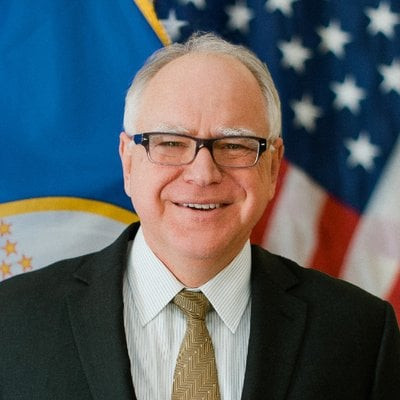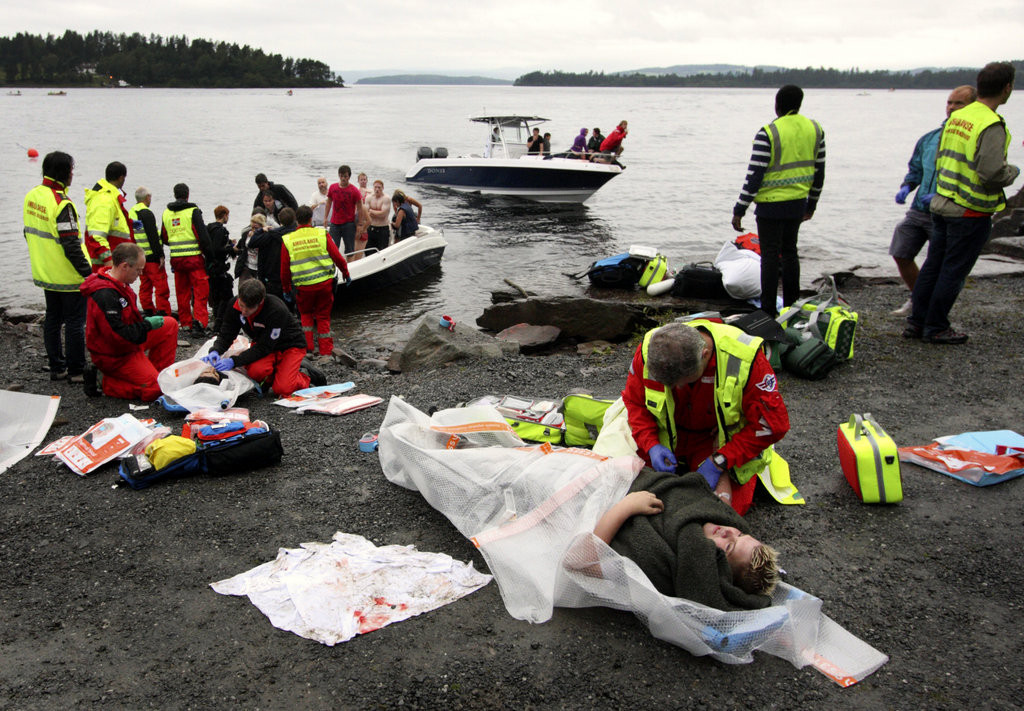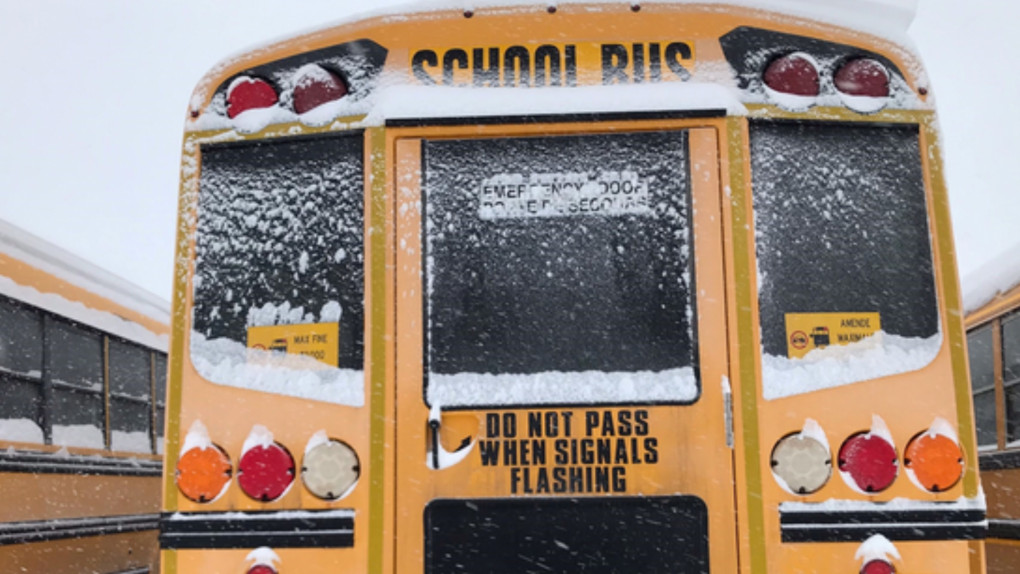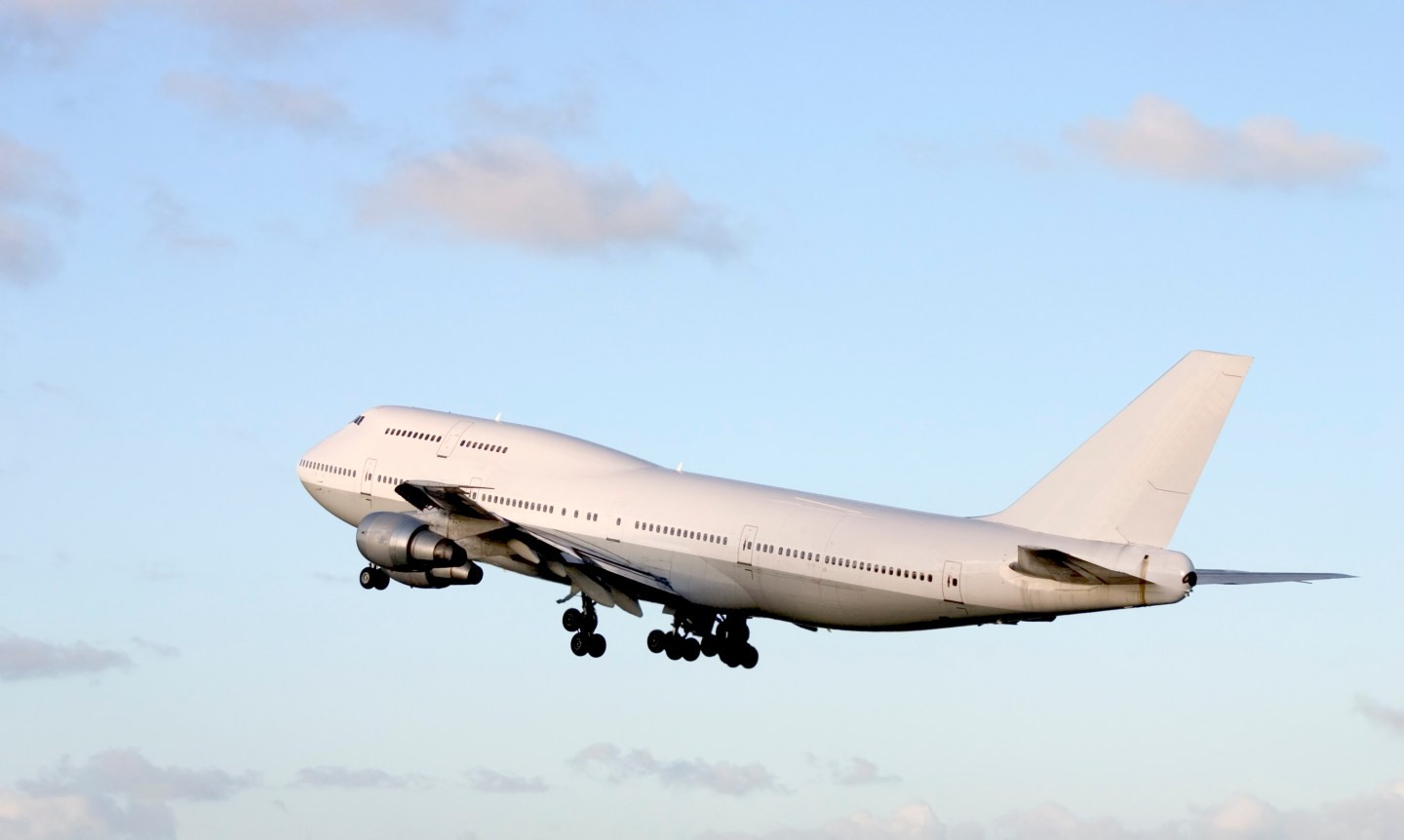Minnesota Lt. Gov. Peggy Flanagan and Gov. Tim Walz laugh at the Minnesota Capitol during a speech by Minnesota Supreme Court Chief Justice Natalie Hudson on April 22, 2024. Photo by Michelle Griffith/Minnesota Reformer.
Democrats have swiftly fallen for Minnesota Gov. Tim Walz’s Midwest dad persona, sharing videos of him working on a car, going on a rollercoaster with daughter Hope at the State Fair, signing a bill renaming a street in Prince’s honor in purple ink. But he’s also got a long record as governor.
Walz’s first term was largely defined by the gridlock of divided government and crisis management in response to the COVID-19 pandemic and the aftermath of the police murder of George Floyd.
But once Democrats swept control of state government in the 2022 elections with Walz at the top of the ticket, they passed one of the most significant progressive agendas in the nation’s recent history with just a single-seat Senate majority.
Walz represented a Republican-leaning district in the U.S. House and was widely seen as the more centrist of the two leading Democratic candidates for governor, but he’s become a champion of progressive policy as governor. With few exceptions, Walz supported what the Democratic majorities in the state House and Senate could muster the votes to pass.
Those bills — ranging from protecting abortion access to speeding up energy permitting to increasing protections against wage theft — have excited the nation’s Democratic base, which is beginning to learn about the trifecta’s work over the past two years.
Minnesota Gov. Tim Walz: A Look at His Key Policies
Among the first bills Walz signed after Democrats took control of the Legislature was the Protect Reproductive Options Act, guaranteeing that “every individual has a fundamental right to make autonomous decisions about the individual’s own reproductive health.”
The law fulfilled a campaign promise that helped Democrats win control of state government after the U.S. Supreme Court overturned Roe v. Wade, allowing states across the South and Midwest to enact draconian restrictions on abortion.
“The message that we’re sending Minnesota today is very clear: Your rights are protected in the state. You have the right to make your own decisions about your health, your family and your life,” Walz said during a ceremonial bill signing in January 2023.
Democrats then passed a “shield law” aimed at protecting women who travel to Minnesota for abortions by prohibiting state courts, law enforcement and health care providers from cooperating with authorities outside the state.
Finally, Democrats eliminated virtually all restrictions on abortion — many of which had already been deemed unconstitutional — including that abortions after the first trimester be performed in a hospital or abortion facility, that both parents of minors be notified and that the state Department of Health keep data on abortions.
Perhaps the most popular bill Walz signed into law provides free school breakfast and lunch to all kids at eligible schools, regardless of income. The bill signing at a Minneapolis school created the now-ubiquitous image of a mob of schoolchildren embracing Walz as he laughs.
The 2023 Legislature also boosted K-12 education spending by $2.3 billion and early childhood education by $300 million, although school districts complained much of the new funding went to cover new mandates. Among those mandates was The Read Act, which requires school districts to use evidence-based practices to teach reading. School districts must also provide free menstrual products to students.
One of the more controversial policies Walz signed into law banned school police officers from using prone — e.g., face down — restraints on students, which created a mini political crisis when some police departments pulled their officers from schools. Walz said he doesn’t support the use of face-down holds but also signed the bill repealing the ban.
Walz signed a bill providing free college tuition for University of Minnesota and Minnesota State campuses, for families with income of $80,000 or less.
For Walz, a former teacher, achieving a “Minnesota Miracle 2.0” would define his legacy as governor. But the state’s above-average achievement has sunk closer to average during his tenure, while racial disparities, among the worst in the nation, have persisted. In 2015 the Annie E. Casey Foundation ranked the state sixth overall in the U.S. on education quality. By 2024 Minnesota had fallen to 19th place. Increased funding for schools, science-based reading instruction requirements and free universal meals will likely take years to yield results.
Addressing the Pandemic's Impact and Promoting Worker Rights
Walz was criticized by Republicans for keeping schools shuttered longer than in many Republican-led states. The long periods of remote learning damaged the academic and social/emotional progress of many children, but Walz and his allies said the risk to staff and families was too great.
A federal program — administered by the state Department of Education — designed to feed hungry children when schools and daycares closed became the source of a massive fraud, with over $250 million gone missing. The U.S. attorney has convicted nearly two dozen people of the 70 who have been charged, in what is the biggest pandemic relief fraud in the nation.
Walz signed into law one of the most significant pro-worker agendas in state history in 2023, including paid sick leave and a state-run paid family and medical leave program providing up to 20 weeks of leave in a single year.
Democrats banned noncompete agreements; banned anti-union captive audience meetings; expanded unemployment benefits to hourly school workers who are off during the summer; made general contractors liable for wage theft by their subcontractors; and raised workplace safety standards at meatpacking plants and Amazon and other big warehouses. The state also established a nation-leading Nursing Home Workforce Standards Board with the power to set wages across the industry.
A Champion for Clean Energy and Environmental Protection
One-hundred percent of Minnesota’s energy must come from carbon-free sources by 2040 under a bill Walz signed into law in early 2023, putting the state on one of the most aggressive timelines to shift away from fossil fuels. He also signed a bill to speed up permitting for new energy projects.
While celebrated by environmentalists at the time, his administration has recently earned their ire by advocating for the “carbon free” definition to include burning wood and trash for energy since those sources will emit carbon dioxide whether burned for electricity or left to decompose.
Walz also moved aggressively to curb greenhouse gas emissions by making Minnesota the first state in the Midwest to adopt California’s clean car standards. The standards, which requires car dealers to offer more hybrid and electric vehicles, are set to take effect next year after surviving a lengthy legal battle. His administration’s adoption of the rule will likely provide fodder to the Trump campaign, which called Walz a “radical leftist” in a statement on Tuesday.
Along with clean car standards, Walz approved additional tax credits to bring down the cost of electric cars and e-bikes.
Facing Challenges: Pipeline Protests and Healthcare Reform
Early in his first term, Walz continued a legal challenge from his predecessor’s administration to Enbridge’s Line 3 replacement pipeline. Enbridge ultimately completed the new oil pipeline despite legal challenges and protests by some Native tribes and environmental activists — including outside the governor’s residence. Walz faced harsh criticism from those groups for not using executive power to halt construction.
Environmentalists have also been disappointed that Walz hasn’t tried to stop plans for copper-sulfide mining near the Boundary Waters and in the St. Louis River watershed that feeds into Lake Superior. His administration has defended state permits for PolyMet’s proposed mine near Babbitt, and allowed Twin Metals to conduct drilling tests on state land near the Boundary Waters.
The Biden administration essentially put a 20-year moratorium on the Twin Metals proposal, however, by removing 225,000 acres near the protected wilderness from the federal mining leasing program. Those projects are supported by trade unions, which has put competing pressure on Walz from two important constituencies.
Walz spent his first term under divided government fruitlessly pushing for expansion of MinnesotaCare, Minnesota’s health insurance program for the working poor. With Democrats in power, Walz signed a bill moving the state toward establishing a public option that allows all residents without employer-subsidized health insurance to buy into MinnesotaCare. The earliest that could begin is 2027, and lawmakers must still receive federal approval and find a way to fund the new social benefit.
Addressing Housing, Criminal Justice, and Election Reform
Minnesota lawmakers increased the state’s spending on housing about ninefold with a $1 billion spending package — paid for with part of the $17.5 billion surplus in 2023 — to increase affordable housing, prevent homelessness, expand homeownership opportunities and provide rental assistance to thousands of households.
A bipartisan group of lawmakers aimed to increase housing construction by overriding local zoning laws that restrict development and economic inclusion. Most of those proposals failed to get enough support, however, although Walz did sign a bill ending an environmental lawsuit against Minneapolis over its pro-density 2040 plan.
The aftermath of the police murder of George Floyd in 2020 presented one of the greatest political and governing challenges of Walz’s career. The widespread destruction of the riots, which followed decades of police abuses, created a lasting liability for him. Minneapolis Mayor Jacob Frey blamed Walz for hesitating to call in the National Guard while the city burned, while Walz’s office said the city did not provide enough detailed information for them to deploy the National Guard until the afternoon of May 28 — after three nights of protests and rioting.
Trump, at his rally in St. Cloud, falsely said he saved Minneapolis by calling in the National Guard, and Republicans have hammered Walz for “allowing” the rioting four years ago.
At the time, Walz also faced pressure to quickly pass police reforms by those far to the left of him championing “defund the police,” a slogan that continues to haunt mainstream Democrats.
Walz did sign a bipartisan bill in 2020 with policing changes, including a ban on certain chokeholds; a ban on “warrior-style” training for police officers; and, residency incentives for police officers to live in the city they patrol.
Later, with control of state government, Democrats passed a more sweeping package of changes to policing and criminal justice broadly.
Walz signed a bill changing the state’s standard for deadly force, saying it “shall be exercised judiciously and with respect for human rights and dignity and for the sanctity of every human life.”
Walz also signed a bill banning cops from entering homes without knocking first — with limited exceptions — in response to the 2022 police killing Amir Locke, a young Black man not suspected of any crime.
He also signed off on a massive overhaul of the state’s prison system, making it more rehabilitative and less punitive in an effort to reduce recidivism. It includes earned release, in which prisoners can get out earlier and shorten their community supervision time after they get out if they participate in rehabilitation programs. Now, prisoners can get out when half their sentence has been served if they complete programs and behave well; Republicans called it a “get out of jail free” bill.
Walz also signed legislation that limits probation to five years for most felonies (except for homicides and sex crimes); made phone calls free for prisoners; legalizes possession of drug paraphernalia; made it easier for people to expunge non-violent crimes from their records; made it easier to get clemency; and banned people involved in hate or extremists groups from being licensed as police officers.
While governor, the state gave $300 million to cities, counties and tribal governments to spend on law enforcement as they see fit and invested $70 million in community violence prevention grants for victim services, prison re-entry, homelessness assistance, restorative justice, violence interruption and juvenile diversion.
Last year Walz signed legislation restoring voting rights to felons who are no longer imprisoned. The law was upheld this week in the face of a legal challenge.
The bill restored the right to vote to over 50,000 Minnesotans who have completed their sentences but remain on probation or parole. Prior to that, they had to wait until they were out from under the government’s control and had paid their fines and restitution. Given Minnesota’s lengthy probation, that could add up to years.
Walz also signed the Democracy for the People Act, which aims to make casting a ballot easier. The law includes automatic voter registration; allows 16- and 17-year-olds to pre-register to vote; and creates a permanent mail voting list, meaning voters can be automatically sent a mail ballot for every election, without having to apply for one.
A Look at Tax Policy and Other Notable Decisions
The Legislature passed and Walz signed a 1% sales tax increase in the seven-county Twin Cities metro area, with .75% dedicated to transportation and .25% for housing. It was a major victory for Democrats, who had long sought dedicated funding sources for public transportation and affordable housing. But the tax hike — passed when the Legislature had a $17.5 billion surplus — drew outrage from Republicans.
Walz also signed a bill tying the state’s gas tax to inflation — capped at 3% — which was a politically risky decision as consumers’ budgets were battered by high gas prices and high inflation.
In addition to tax increases, Walz and his Democratic colleagues exempted Social Security income from taxes for joint filers earning less than $100,000 a year.
They also championed tax credits for low-income families, and the state earned the recognition of having the most equitable tax system in the country, according to the left-leaning Institute on Taxation and Economic Policy. Democrats exempted
Walz signed one of the nation’s largest child tax credits, which is steeply graduated, granting $1,750 per child for low-income Minnesotans. It begins to phase out for married filers who make $35,000 annually and $29,500 for single taxpayers.
Walz also signed a bill expanding the Working Family Credit, which is the state equivalent of the federal Earned Income Tax Credit.
The Legislature passed and Walz signed a one-time tax rebate of $260-$1,300, depending on family size, in what became colloquially known as a “Timmy stimmy.”
The former renters’ tax credit has become an income tax credit, which is expected to sharply increase the number of people who claim it.
Even as legislators pushed for a novel tax increase on corporations’ international revenue, as well as a fifth income tax tier, Walz let those proposals die on the vine.
The perception going into the 2018 campaign for governor that Walz was a moderate was due in large part to his position on guns. He grew up around guns, was a skilled marksman during his military career, hunts pheasants and had long been endorsed by the NRA.
That changed after the Marjory Stoneman Douglas High School massacre in Parkland, Florida, which also coincided with Walz’s campaign to win the Democratic-Farmer-Labor endorsement that spring.
“The world’s changed. I’ve changed,” he said at the time.
Since then, he signed bills requiring background checks for all private gun sales; allowing a judge to temporarily take a person’s guns if they are deemed a threat to themselves or others, e.g., a “red flag” law; and increasing the penalty for straw purchases of guns, as when a person buys guns for the express purpose of helping someone get a gun when they are not legally allowed to. That law passed in the wake of the killing of three first responders by a gunman alleged to have used a firearm obtained via a straw purchase.
A Controversial Figure: A Closer Look at Walz's Strengths and Weaknesses
Walz’s record as governor has not been without controversy. Some critics argue that his approach to certain issues, such as the handling of the COVID-19 pandemic, has been too cautious or too restrictive. Others have criticized his handling of certain social issues, such as his support for environmental regulations or his handling of police reform.
However, supporters of Walz point to his record of accomplishments, including his work to expand access to healthcare, education, and affordable housing. They also highlight his commitment to environmental protection and his efforts to promote worker rights. Ultimately, Walz’s legacy as governor will be shaped by how he balances these competing priorities in the years to come.
What Does This Mean for the Future of Minnesota?
The 2024 election will be a test of whether Walz can maintain his popularity and successfully navigate the challenges of leading a divided nation. The outcome of the election will have a significant impact on the future of Minnesota and its people, as the state continues to grapple with complex issues such as healthcare, education, and the environment.
The state's approach to these issues will be crucial in shaping the future of Minnesota and its people, as the state continues to grapple with complex issues such as healthcare, education, and the environment.

















